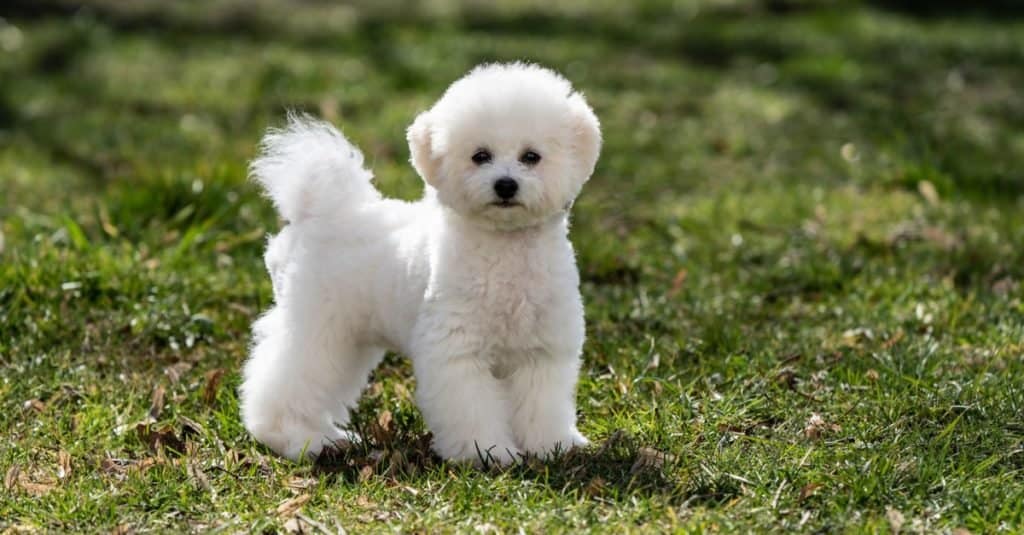Embarking on a bichon frisé’s pregnancy journey is a mix of excitement and apprehension. The joy of nurturing adorable puppies is accompanied by concerns about potential complications. Careful attention and preparation are key to ensuring a safe and successful pregnancy for your beloved dog and her future offspring.
Ease your worries, plan effectively, and anticipate the journey ahead by learning about bichon frisé pregnancy and being prepared for every step. In this article, we’ve compiled all the vital information you need to know about bichon frisé pregnancy, including the gestation period, weekly milestones, and how many puppies you should expect. We’ve also compiled a care guide to help you care for your fluffy companion during this critical period.
At What Age Can Bichon Frisé Get Pregnant?
A female dog will begin experiencing heat or estrus at about six months old, indicating they are ready for mating. From then onwards, they’ll experience heat approximately every six months for the rest of their life.
Some signs that indicate your dog is in heat include bleeding, swollen vulva, increased nervousness, and frequent urination. You’ll also notice that your bichon frisé is more receptive to male dogs and will present herself to them by raising its rump and holding its tail off to the side.
That said, just because your dog is ready to mate doesn’t necessarily mean they are ready for breeding. It’s advisable not to breed young female bichon frisé during their first and second cycle. The reason is that they haven’t reached full maturity, so their eggs are also not mature.
You can consult a vet to know when your dog is mature enough to be bred.

A female bichon frisé will begin experiencing heat at about six months old.
©Ieva Tvaronavicute/Shutterstock.com
What is the Gestation Period for a Bichon Frisé?
All dogs, bichon frisé included, are usually pregnant for nine weeks (63 days) after conception—this could vary by a few days.
Even so, determining the exact conception time can be challenging, given that a female’s egg can remain fertile for two days. Also, the sperm can remain viable for a couple of days.
In short, knowing the exact mating time won’t do much in helping you determine your bichon frisé’s pregnancy period accurately—it can, however, allow you to approximate when to expect your dog to deliver.
Bichon Frisé Pregnancy Calendar (Weekly Milestones)
Week 1 (Days 0-7): Mating and Fertilization
After mating your bichon with a suitable sire, multiple eggs come to the uterus for fertilization—you may need to breed her more than once for successful fertilization.
In the initial stage of bichon frisé pregnancy, hormonal changes may cause morning sickness and a light pink vaginal discharge.
While physical changes are not yet visible, continue regular feeding, playtime, and monitoring for potential infections. If an infection is suspected, promptly seek veterinary guidance for appropriate treatment.
Week 2 (Days 7-14): Maintenance
At this stage of bichon frisé pregnancy, the cells that will develop into puppies begin to grow and separate. The new tiny embryos descend into the uterus, where they will continue to develop during the remainder of the gestation period.
You still need to feed, engage, and exercise with your dog normally during this phase. The goal is to ensure that your dog maintains its weight (it shouldn’t gain more than 10% of its pre-pregnancy weight until it’s six weeks pregnant) and energy levels to ensure the healthy growth of the embryos.

During week 2 of the pregnancy, it’s important to continue feeding, engaging, and exercising your dog.
©Radovancev Zarko/Shutterstock.com
Week 3: (Days 14-21): Implantation
During this phase, the embryos start implanting into the uterus— they’ll receive essential nutrients and life support from their mother’s body while in the uterus. At this time, the embryos are about one centimeter long.
Although there may not be significant physical changes, expect an increased appetite in your dog during this stage. Ensure a smooth transition by gradually adapting her diet to meet her increasing nutritional needs, avoiding sudden dietary changes.
Week 4: (Days 21-28): Pregnancy Confirmation
During this stage, the faces of the puppies start to shape, and their eyes and spine begin to develop. They also increase in length to about 1.5 centimeters. The teats of your bichon frisé also start to swell.
As you can see, the fourth week is the most formative week of your bichon frisé’s pregnancy, when the developing puppies are most vulnerable to injuries and defects. As such, you should limit rough play and strenuous exercises in your dog to help ensure the healthy growth of the puppies.
You should also take your dog to your local vet clinic for a check-up. Get an ultrasound for your bichon frisé to see the litter size and the overall health of the puppies, and even get a reliable birth date. The check-up can help promptly resolve any abnormalities or problems discovered.
Finally, don’t forget to ask your vet about the nutritional changes you should make to your pregnant bichon frisé’s diet.
Week 5: (Days 28-35): Fetal Stage
At this stage, the puppies have completed embryogenesis and have developed into fetuses. Individual toes of the puppies begin to form, the claws are more visible, and the whiskers start to grow. The puppies also begin to develop male and female sexes.
You’ll begin noticing significant changes in your bichon frisé’s weight. If you haven’t increased your dog’s food rations, this is the time to do so. Feed it small rations but frequently. The fifth week of pregnancy may also be the ideal time to introduce your preferred puppy food into her diet.

During the fifth week, you may introduce puppy food into her diet.
©Eudyptula/Shutterstock.com
Week 6: (Days 35-42): The Turning Point
Your pregnant bichon frisé will undergo significant physical changes in the sixth week. For instance, its tummy will be larger because her puppies are now bigger. Its nipples will also become darker.
Besides the physical changes, your dog’s appetite will continue to increase. Give it more food and let it eat as much as it can. You may add multivitamins to its diet and increase the amount of puppy food you feed it.
The growing puppies will also undergo notable changes in the sixth week–they will develop skin pigmentation and marking that will define their color and looks.
These developments indicate that birthtime is just around the corner. As such, you should start preparing the bed or box your bichon frisé will use for whelping. Ensure you make it as comfortable and inviting as possible.
Week 7: (Days 42-49): The Shedding of the Hair
Your dog will begin shedding her belly hair in preparation for birth—don’t be alarmed, as this is normal.
You’ll need to adjust your dog’s diet in the seventh week of its pregnancy. Stop feeding it the puppy food you introduced into its diet and return to regular nutritious foods. Doing this will trigger her body to start storing calcium from the puppy food she has been eating. This mineral will come in handy in the final stages of pregnancy.
Week 8: (Days 49-56): The Nesting Stage
Your puppies can be born from week eight onwards. As such, you should be ready. Avoid subjecting your pregnant bichon to strenuous exercises, rough play, or stimulation that might induce early labor. Remember, the ideal time for your puppies to be born is after nine weeks.
In the eighth week, your bichon frisé will begin nesting. She will become more distant and spend most of her time sleeping. Your dog’s appetite will also decline, primarily due to gestation discomfort. It is important to provide the right nourishment that will provide strength for the bichon frisé to deliver her puppies when the time comes. Choosing a suitable and nutritious diet will help ensure the mother has the necessary energy and resources for a successful delivery.
Towards the end of the eighth week, your dog will start producing colostrum and then milk afterward.

In the eighth week, you may notice your dog begin to nest and spend more of her time sleeping.
©Ollie Webb/Shutterstock.com
Week 9: (Days 56-63): Delivery Time
Birth is imminent at this stage. Ensure everything is ready. Your bichon frisé should be comfortable and have established her whelping bed by now.
Just like in the eighth week, your bichon frisé will have a low appetite as it approaches the whelping time. Check on her regularly—take her temperature, feed her (she might stop eating right before birth), and ensure she is as comfortable as possible.
Remember: When her rectal temperature drops to below 38°C or 100°F, that’s a sign that she will go into labor within the next 2 hours. When that time comes, the best thing to do is monitor her and help her only when necessary.
How Many Puppies Can a Bichon Frisé Have?
On average, a bichon frisé gives birth to four puppies but can have a maximum of six. One of the primary factors that play a role in how many puppies a bichon births is its size. For example, a relatively small dog can birth 1-3 puppies, while a larger one can have 5-6 puppies in one pregnancy.
Even so, smaller dogs have a significant advantage over larger ones regarding pregnancy—they are less likely to go through pregnancy complications. However, with proper care, your bichon frisé will undergo a smooth pregnancy and give birth to healthy puppies regardless of how small or big she is.

A small bichon frisé can give birth to 1-3 puppies, while a larger one can give birth to 5-6 puppies in one pregnancy.
©Ljupco Smokovski/Shutterstock.com
Ways to Care for a Pregnant Bichon Frisé
The news of your bichon’s pregnancy is worth celebrating. However, it comes with a new responsibility—you need to care for your dog during this period to ensure she is safe and healthy.
So how do you care for your furry four-legged companion during her pregnancy? Here are the four things you need to provide:
1. Proper Nutrition
Your bichon frisé needs proper nutrition during pregnancy. So if you weren’t giving adequate nutritious food, this is the time to start doing so. Consult your local vet before purchasing new dog food.
However, if your dog was already on good quality food before the pregnancy and is at a healthy weight, continue giving it nutritious food. Don’t alter the diet in the first six weeks of pregnancy unless your veterinarian advises otherwise. Remember, drastically increasing food rations in the initial stages of pregnancy could result in your dog being overweight, putting her puppies’ health at risk.
The recommended time to start increasing the quantity of food you give to your dog is at about five weeks pregnant. Gradually increase food intake up to a point where she consumes around 35-50% more than usual. You could even add nutrient supplements and puppy food to her diet during that stage.
2. Engagement and Exercise
Just like exercise is essential for pregnant women during a particular stage of their pregnancy, the same can be said for dogs. In the first few weeks of your bichon frisé’s pregnancy, you should engage her in the exercise she used to do before her pregnancy. The exercises will prevent her from gaining a lot of weight early in her pregnancy and ensure the development of healthy puppies.
However, you should tone down the intensity of the exercises later in her pregnancy as she gains more weight. She needs most of her energy to carry her pups and give them nutrition at this stage. The best exercise during her last trimester would be shorter and more frequent walks.

Regular exercise during the pregnancy helps with the healthy development of the pups.
©Mladen Mitrinovic/Shutterstock.com
3. Regular Grooming
If there’s one time you shouldn’t neglect grooming your dog is when they are pregnant. Regularly groom your pregnant bichon frisé to remove dirt, oil, and skin debris. Increase the thoroughness of the grooming before your dog begins to whelp. Focus more on the breast area to ensure the breasts are ready for puppy nursing.
4. Regular Visits to the Vet
Regular vet visits can help ensure your dog remains healthy throughout its pregnancy.
After ascertaining that your bichon frisé is pregnant, the vet will examine her for any anatomical or chemical concerns that could help prevent her from having a healthy litter. For instance, the vet could discover a worm problem and start deworming your dog early. Remember deworming a pregnant dog up to about two weeks before whelping reduces the number of hookworms and roundworms in newborn puppies, ensuring they can grow and thrive to their utmost.
Vet visits are also necessary for discussing your dog’s dietary needs during pregnancy. Through vet visits, you could also determine whether your dog may encounter any problems while giving birth. If that is the case, you can schedule a caesarean delivery.

Vet visits are necessary to ensure that your pregnant dog is healthy.
©Svetography/Shutterstock.com
5. Preparing for Puppies
Another way to care for your bichon frisé is to prepare for her puppies. As your dog’s delivery time approaches, you want to prepare her for whelping and puppy birthing. You can do that by preparing a whelping bed or box and putting it in a quiet place where your dog won’t be disturbed by loud noises.
Ensure you introduce her to the whelping bed beforehand. Otherwise, she might decide to deliver someplace else.
A Recap of Bichon Frisé Pregnancy Guide
The pregnancy period of your bichon frisé can be stressful, but it doesn’t have to be. Understanding the gestation period, weekly milestones, and proper care during a bichon frisé’s pregnancy is essential for ensuring the well-being of both the mother and her puppies.
From the early stages of hormonal changes to the later weeks of fetal development, providing a supportive environment and appropriate nutrition is crucial. By following a comprehensive care guide, you can nurture a healthy and happy bichon frisé during this special time.
The photo featured at the top of this post is © Radovancev Zarko/Shutterstock.com
Ready to discover the top 10 cutest dog breeds in the entire world?
How about the fastest dogs, the largest dogs and those that are -- quite frankly -- just the kindest dogs on the planet? Each day, AZ Animals sends out lists just like this to our thousands of email subscribers. And the best part? It's FREE. Join today by entering your email below.
Thank you for reading! Have some feedback for us? Contact the AZ Animals editorial team.







